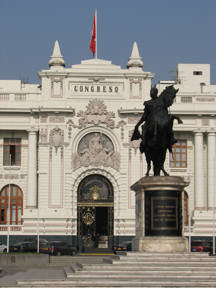WELCOME TO THE ARCHIVE (1994-2014) OF THE MAQUILA SOLIDARITY NETWORK. For current information on our ongoing work on the living wage, women's labour rights, freedom of association, corporate accountability and Bangladesh fire and safety, please visit our new website, launched in October, 2015: www.maquilasolidarity.org
December 29, 2011
Precarious work, and in particular the abuse of short-term employment contracts and employment agencies, is recognized as a growing problem in the garment industry world-wide, and one that is increasing workers' vulnerability and limiting the exercise of freedom of association. MSN worked with national, regional and international counterparts to address this dangerous shift toward precarious work and the negative consequences for workers and their communities.
 Six international apparel companies have sent an open letter to the President of Peru supporting a repeal of three articles of a decades-old law allowing employers in the garment and textile export sector to hire workers on consecutive short-term employment contracts, thereby denying them job security, seniority rights and other benefits, access to health and pension coverage, and their right to organize and bargain collectively.
Six international apparel companies have sent an open letter to the President of Peru supporting a repeal of three articles of a decades-old law allowing employers in the garment and textile export sector to hire workers on consecutive short-term employment contracts, thereby denying them job security, seniority rights and other benefits, access to health and pension coverage, and their right to organize and bargain collectively.
 On March 20-21, representatives of national and international unions and labour rights organizations, major apparel brands, multi-stakeholder initiatives, the labour ministry, and local suppliers met in Lima, Peru to discuss how short-term employment contacts impact on workers' rights in the country's garment and textile industry.
On March 20-21, representatives of national and international unions and labour rights organizations, major apparel brands, multi-stakeholder initiatives, the labour ministry, and local suppliers met in Lima, Peru to discuss how short-term employment contacts impact on workers' rights in the country's garment and textile industry.

In this period of global economic instability, the lives of workers employed in global supply chains are becoming more and more insecure. Not only are workers confronted on a daily basis with the very real possibility that their factories will be closed as production is shifted to other countries and regions with lower labour costs, they are also facing changing employment relationships in their own countries that are making their working lives more precarious.